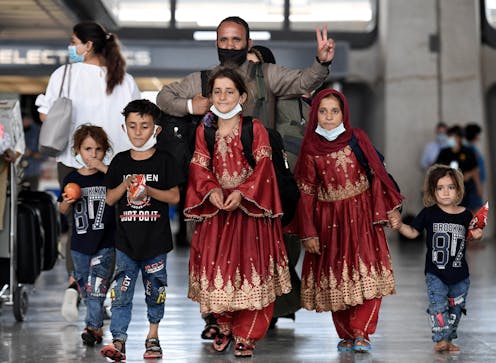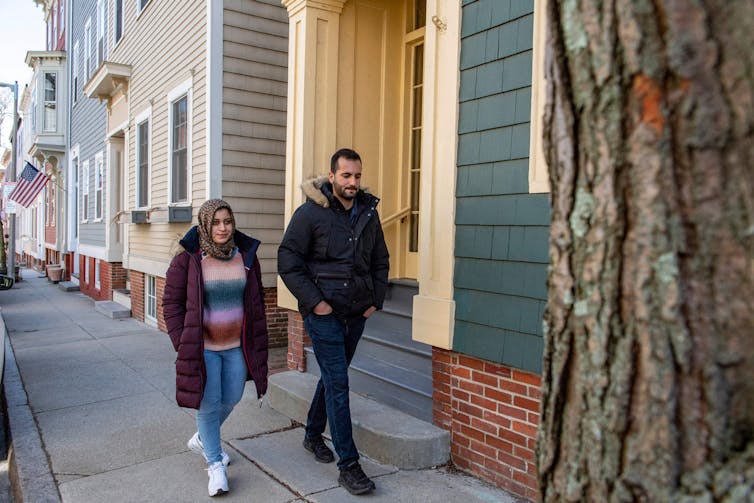Presidential election could help decide fate of the 70,000 Afghans living temporarily in the US
While the US admitted about 70,000 Afghans into the country on an emergency basis in 2021, the measure is temporary, and these people remain in legal limbo.

The Taliban, an ultraconservative Islamic political group, retook control of Kabul a little more than three years ago, dashing many Afghans’ hopes for a tolerant, democratic government.
As U.S. troops withdrew from Afghanistan days after the Taliban’s resurgence in 2021, hundreds of thousands of Afghans flocked to the Kabul airport, desperate to be evacuated. Among them were Afghans who worked for U.S. military and NATO forces as interpreters and in other roles – in addition to other people who were afraid of the Taliban.
Chaotic and sometimes violent scenes of the poorly planned evacuation captured media attention for weeks, as the U.S. military airlifted nearly 124,000 people out of Afghanistan.
Many of the Afghans who fled their country in 2021 went to Iran, Pakistan and other nearby countries. To offer a lifeline to the Afghans who came to the U.S., the Biden administration announced on Aug. 29, 2021, that evacuated Afghans could legally – but temporarily – stay in the U.S.
As a scholar of civil conflict and refugee migration, I have been following the Afghan evacuation and policy responses in Washington since 2021. While President Joe Biden renewed humanitarian parole for approximately 70,000 Afghans in 2023, these people remain in legal limbo, unable to fully move forward in their lives.
The upcoming election will likely be decisive in resolving Afghans’ legal status or not.

Understanding humanitarian parole
The U.S. admitted Afghans into the country through what’s called humanitarian parole, a federal program that the president can authorize to give protection to people in other countries facing extreme emergency circumstances.
Humanitarian parole must be renewed by a presidential administration every two years, unlike the U.S. refugee admission policy, which gives foreigners who face legitimate fears of returning home the right to get permanent residency in the U.S.
The Afghan parole program enabled people like Mina Bakhshi – a female rock climber who had no future under the Taliban because of her gender – to enter the U.S. and attend college.
It also helped people like Qasim Rahimi, a journalist in Afghanistan, to flee to safety with his family and settle in Kansas City, Missouri.
About one-third of the Afghan evacuees who came to the U.S. settled in California, Virginia and Texas, while the rest settled in other states.
Yet humanitarian parole is not a permanent solution.
While these Afghan people can legally work and attend school in the U.S., they often face obstacles with getting stable work or even finding a home to rent because they are not permanent residents and do not have Social Security numbers.
A long history of parole in the US
Typically, the U.S. government has used humanitarian parole to rescue people from conflicts in which U.S. armed forces are involved, like Vietnam and Ukraine.
People who face serious danger because of conflict or other reasons can also enter the U.S. by applying for and receiving refugee status, but it can take more than a year for it to be granted. Humanitarian parole lets the U.S. government act quickly when it wants to help foreigners come to the country during an emergency.
At the end of the Vietnam War in 1975, for example, the U.S. admitted thousands of Vietnamese, Cambodian and Laotian migrants fleeing their countries.
As then-President Gerald Ford stated in an address to Congress in 1975, providing humanitarian parole to Vietnamese people who supported the U.S. in its war effort in Vietnam was a “profound moral obligation.” In 1977, Congress passed a law that allowed these refugees to permanently settle in the U.S.
The U.S. also issued humanitarian parole to Hungarian and Cuban refugees who fled communist dictatorships in the 1950s.
More recently, the U.S. granted parole to a group of Haitian orphans following a major earthquake in 2010, and to children from Central America who illegally crossed the border without their parents during the Obama administration.
In 2022, the U.S. government again used humanitarian parole to welcome more than 125,000 Ukrainians fleeing the war in their country.
What the Afghan Adjustment Act would do
While Biden issued temporary humanitarian parole to Afghans in 2021 and renewed it in 2023, only Congress has the power to pass an act that would ensure they can legally stay in the country permanently. Yet, a deadlocked Congress has failed to pass legislation to adjust the status of Afghans.
A proposed bipartisan bill in Congress called the Afghan Adjustment Act would allow Afghan parolees to apply for permanent legal status.
A coalition of refugee advocates and veterans organizations has championed the Afghan Adjustment Act.
Yet, a handful of Republican lawmakers, led by Sen. Chuck Grassley, have opposed the act on national security grounds. They say that vetting procedures for newcomers are not sufficient, which could lead to security risks. Some want a more targeted program that focuses only on Afghans who worked with U.S. troops.
Republican Sen. Tom Cotton has proposed another bill that would significantly reduce a president’s authority to use humanitarian parole for Afghans or anyone else in the future.

The election factor
The fate of Afghan parolees will likely be determined by the results of the upcoming election. Should Democratic presidential nominee Kamala Harris win office, I believe she is likely to renew parole for Afghans for at least two more years, as Biden did in 2023. Congress may be more likely to pass the Afghan Adjustment Act after the election, since it is rare to pass major legislation during an election period.
What Republican presidential nominee Donald Trump might do about Afghans living temporarily in the U.S. is an open question. During Trump’s previous presidential term, his administration focused in part on curbing immigration. This included slashing refugee admissions and making it harder to issue U.S. visas to Afghans and Iraqis who worked with the U.S. military.
On the campaign trail, Trump has promised to renew his travel ban on Muslims and to continue to limit immigration to the U.S.
In the meantime, Afghans who fled the Taliban continue to face uncertainty about their future in the U.S.
Idean Salehyan is affiliated with the Niskanen Center in Washington, D.C.
Read These Next
Election officials are hard at work to deliver fair, secure and accurate elections – despite a const
The people who run US elections are, according to a scholar who studies them, politically neutral professionals…
Aurora and Springfield aren’t the first cities to become flash points in US immigration debate − her
A scholar of emerging immigrant destinations says that when anti-immigrant politicians bring their hateful…
Tim Walz’s candidacy for vice president underscores the political power of teachers
Throughout the world, teachers and their unions have played a crucial role in politics and democracy.…






